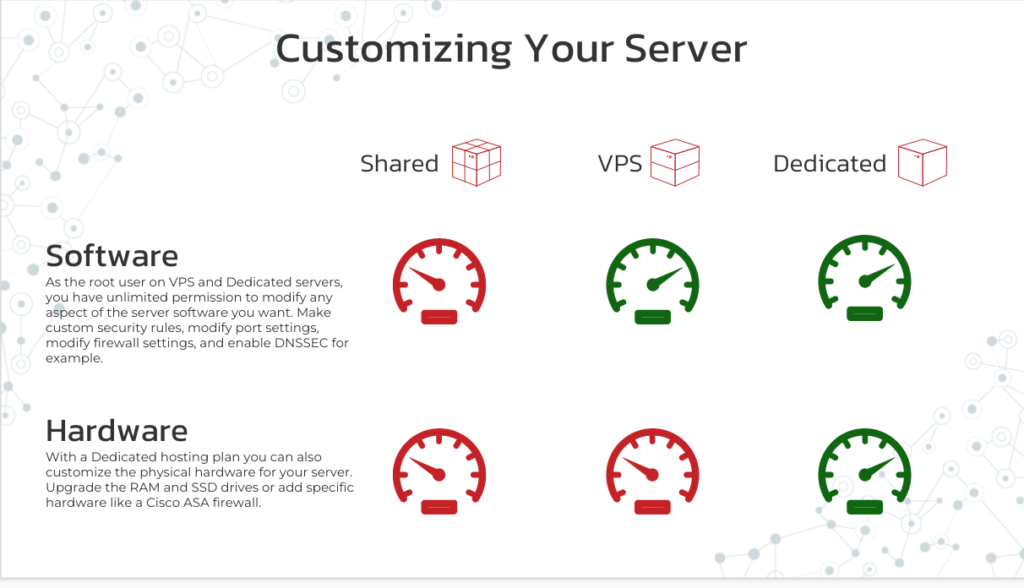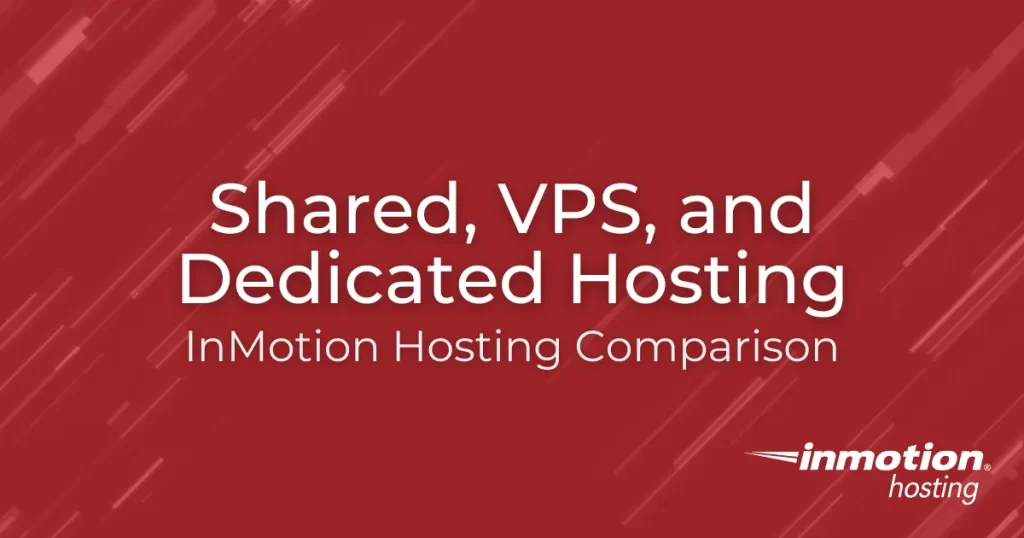With all the different types of web hosting available, it can be confusing as to which one is right for you. Do you choose Shared Hosting, Managed VPS Hosting, or a Dedicated web hosting plan? You may just be wondering what a VPS or Shared Hosting is.
In this guide, we will explain what Shared, VPS, & Dedicated hosting plans are and list the differences between them so you can determine which is right for you.
Hosting Platform Analogies
Shared Hosting
Shared Hosting is very similar to living in an Apartment Complex. All residents are in the same location and must share the available resources with everyone including the pool, parking lot, and playground. In shared hosting, all accounts must share the available resources with all the other accounts on the server. These include CPU time, memory, and disk space. Our System Administrators monitor all of our shared servers 24/7.
Managed VPS Hosting
Managed VPS Hosting includes our VPS 2GB RAM, VPS 4GB RAM, VPS 6GB RAM, and VPS 8GB RAM plans and is similar to owning a Condo. While you still share things on the property, you are ultimately responsible for maintaining your property and repairs inside the condo. There are also significantly fewer residents per building.
On a Virtual Private Server (VPS), not all resources are shared. The overall CPU time and memory are shared across all accounts on the machine, but at the same time, portions of those resources are always dedicated to each account. This allows for more power and flexibility than being on a shared account.
Dedicated Hosting
Dedicated Hosting includes our Essential, Advanced, and Elite Dedicated Server Hosting Plans. Dedicated Hosting can be compared to owning a house. You have access to all the resources available on the machine and no one else’s account resides on the machine (your house).
Apartment Living to Condo Living
Shared accounts are great for most users as you can host all sorts of applications on them (such as WordPress) and there are plenty of email accounts to go around. If you compare Shared Hosting to apartment living, a need for an upgrade may arise if you have:
A growing family: If your family grows more than what your apartment can handle, then it may be time to upgrade. In Shared Hosting, if your website becomes popular, you may need to upgrade to Managed VPS Hosting for more CPU and Memory for your account. This will allow you to handle all the new traffic coming to your site.Customizations: If you love the color red and want to paint your walls red, you may not have permission to in an apartment. Moving up to a Condo gives you more ownership of your space, allowing you to paint and decorate however you choose. If you require software that is not available in Shared Hosting, upgrading to Managed VPS Hosting will allow you to install any software that you would like!
Condo Living to Single Family Home Living
Keeping with the condo analogy, you have a lot of control, but you don’t have complete control. There are many reasons that a Condo was great for you at one point in your life, but you’re at the point where you have a big family and there’s a lot going on every day. You may decide to buy a single-family home, where you’ll have plenty of parking and extra bathrooms.
Managed VPS Servers are great for mid-sized businesses because you have a virtualized private server that you can set up and tweak exactly the way you want. A Managed VPS Server is not a Dedicated Server, however, so you are still on a server with other users and your actions can negatively affect them. For example, if you have a very busy website, dominating the server’s CPU time and memory could cause performance issues with other users on the same server.
Shared Hosting vs Dedicated Hosting
There are a number of factors that impact the cost and value of Dedicated Hosting in comparison to Shared Hosting. Below are just a few examples of how dedicated servers differ from shared servers.
Server Performance
One of the potential downsides of shared hosting is that the server shares resources across all users housed within it. This can sometimes lead to a “noisy neighbors” situation where your hosting experience is diminished by the resource-intensive actions of other users on the same server.
By contrast, a dedicated server will have faster response times and greater reliability as it is not impacted by the operations of other users on the server. This is due to having a dedicated server with resources that are only available to you.
For example, InMotion’s most affordable Dedicated server includes a 3.50GHz Turbo Xeon processor, 16GB of DDR4 RAM, 1TB SSD, and 8MB of CPU Cache for each account. This means you would only be affected by your own resource usage and not other people that you are “sharing” the server with.
Customization
A shared hosting service must limit the software installed by multiple users. If not, something malicious could be uploaded that could affect your server’s security. Broken scripts can cause every site on the server to go down. On the plus side, less customization means a much easier learning curve.
A dedicated server gives you more room to customize. You can install optimized software that meets your company and customer requirements without worrying about restrictions or impacting another company’s websites.
With root user access you have unlimited permission to modify any aspect of the server you want. You can make custom modifications specific to the needs of your website or applications.

Server Security
If someone else on your shared server suffers from a hack, your server and all sites on it can suffer performance degradation. In addition, your site’s security could become compromised, particularly if you allow financial transactions on your site or store private customer information.
On a dedicated server, you do not have to worry about other users compromising the entire server. Additionally, you can increase your security by installing hardware and software firewalls as well as powerful security tools that require root-level access not available on shared hosting platforms.
For example, on a dedicated server, you can modify port settings, make custom firewall rules, or configure DNSSEC just to name a few.
VPS Hosting vs Dedicated Hosting
While there are many subtle differences between VPS hosting and dedicated server hosting, here are a few examples of how they differ.
Speed
While users on VPS platforms are partitioned into discrete virtual environments, they all still share the same physical hardware and can only access a fraction of the total system resources.
In dedicated hosting, all system resources are available to the user by default. Having access to these resources improves page load times and increases website responsiveness. It is important to remember that the faster a page loads the more likely a visitor will stay on your site.
Price
Generally speaking, VPS hosting is going to cost much less than any dedicated plan. The reduced cost is due to the shared nature of VPS hosting. This is important to keep in mind when considering your web hosting budget.
Dedicated hosting, by contrast, can be quite expensive due to hardware costs and data center operations. For this reason, dedicated servers are best suited for large-scale applications such as eCommerce businesses.
Scalability
When it comes to expanding your site or increasing the amount of storage you need, a VPS is often the superior solution. Since VPS platforms are managed virtually, upgrading your storage can be done by allocating additional resources from the existing pool of memory.
With dedicated hosting, you will need to physically add additional drives to the server. This costs money and time and can cause downtime on your site as the hardware is installed.
Still not sure if Dedicated Hosting is right for you? Learn more about the uses of dedicated hosting, the importance of data center location, and aspects to consider when looking to upgrade your hosting.
Overall, InMotion Hosting is willing to work with you if you are aware of sudden increases in bandwidth that may exceed your shared or VPS accounts. We can temporarily work with you to increase your account so that you can handle a large influx in traffic.
This is also important when dealing with a loss in business. If you need to move down to a lower server, the account can be reviewed and moved to a VPS or Shared account to reduce your costs while still covering your current bandwidth needs.
Security
Hosting companies do not advertise their security as it would be the same as placing a target on your back. However, shared servers, VPS, and Dedicated server hosting all have different measures of security. Security also involves backups and recovery, and InMotion Hosting does provide these services through the hosting software or through a paid service for VPS and shared server accounts. Dedicated server accounts using cPanel feature the Backup Manager along with larger storage spaces due to their configuration and cost.
Managed plans for all three types of hosting are available and allow users to employ InMotion Hosting support to manage the hardware systems they are subscribing to. Additionally, there are unmanaged solutions that give others the complete control they may want when obtaining server access.
Shared and Dedicated IP Addresses
An IP Address is the unique number tied to a website, computer, or another internet-connected device that allows it to receive and transmit data on the world wide web. A website or account with a shared IP address will use the same IP address as other accounts on a server, while an account with one or more dedicated IP addresses can have exclusive use of a particular IP address.
Shared IP addresses are a great choice for saving money. Using a dedicated IP address can make certain aspects of site management and email administration much easier. Generally, all of our Shared Hosting accounts use shared IP addresses, while VPS, Cloud, and Dedicated Hosting accounts all come with a certain number of dedicated IP addresses. If you’d like to add a dedicated IP address to a Shared Hosting account or add the additional dedicated IP address to your VPS, Cloud, or Dedicated Hosting account, you can always purchase dedicated IP addresses within the Account Management Panel (AMP).

